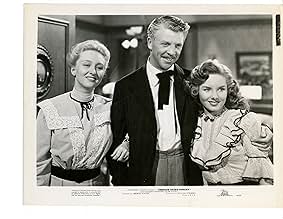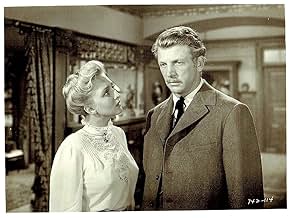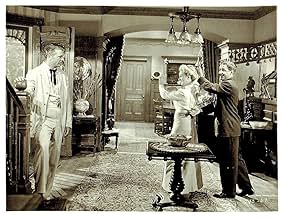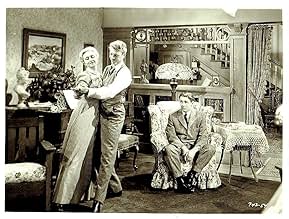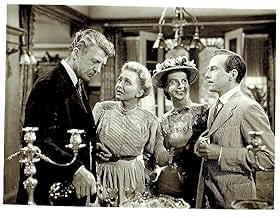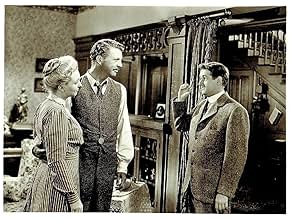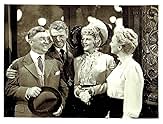Ajouter une intrigue dans votre langueA rueful wife (circa 1910) recalls 20 years of her husband's financial fumbles, as she keeps a boarding house to support the family.A rueful wife (circa 1910) recalls 20 years of her husband's financial fumbles, as she keeps a boarding house to support the family.A rueful wife (circa 1910) recalls 20 years of her husband's financial fumbles, as she keeps a boarding house to support the family.
Claude Airhart
- Reverend
- (uncredited)
George Beranger
- Jake Barker
- (uncredited)
Douglas Carter
- Barfly
- (uncredited)
Avis en vedette
Celeste Holm is superb as the center of this film, which is truly sky-high praise for her skills, because the character she plays deserves a sound kick in the pants. She is the wife of an ambitious and relentlessly self-indulgent blow-hard (perfectly cast Dan Dailey) who would be homeless if it were not for her frugality, industry-- and vanity.
Oh, she may not seem vain on the surface, but what other reason could there be for her to stand by, year after year, as her husband fails at get-rich-quick schemes, forcing her to take in boarders to pay the mortgage and support the family. Every time he schemes, she points out the practical problems, only to succumb when he gives her a compliment. Yes, singular. One. One compliment is enough to make her cave every time.
Marriages aren't like that. Flattery does not overcome a daily struggle to make ends meet-certainly not among Western settlers, which these characters purport to be. Which is another problem with this minimally filmed stage play. It tries to be tough-minded but can't raise itself above the sentimental.
Author Rosemary Taylor admits her memoir was mostly fiction. Which, of course, it has to be. What moron would accept this story as fact? Oh, right - Robert Osborne, the round old gent who, before resting in peace, introduced TCM movies. It's not the first time I thought Osborne was Hollywood's original fanboy, with trivia-level knowledge but no original thoughts or insight, let alone an iota of objective critical authority.
Oh, she may not seem vain on the surface, but what other reason could there be for her to stand by, year after year, as her husband fails at get-rich-quick schemes, forcing her to take in boarders to pay the mortgage and support the family. Every time he schemes, she points out the practical problems, only to succumb when he gives her a compliment. Yes, singular. One. One compliment is enough to make her cave every time.
Marriages aren't like that. Flattery does not overcome a daily struggle to make ends meet-certainly not among Western settlers, which these characters purport to be. Which is another problem with this minimally filmed stage play. It tries to be tough-minded but can't raise itself above the sentimental.
Author Rosemary Taylor admits her memoir was mostly fiction. Which, of course, it has to be. What moron would accept this story as fact? Oh, right - Robert Osborne, the round old gent who, before resting in peace, introduced TCM movies. It's not the first time I thought Osborne was Hollywood's original fanboy, with trivia-level knowledge but no original thoughts or insight, let alone an iota of objective critical authority.
I stumbled across this offering on TCM during a Natalie Wood movie night. I wasn't certain I'd stay with it till the end, but I wound up doing so. It's a great example of the kind of movies "they don't make anymore". Corny & schmaltzy in spots...OK a lot of spots...it nevertheless was amusing, downright comical at times, & the actors made it work. It was great to see Alan Young, as all I recall him from is Mr. Ed. Celeste Holm is a gem, as is Dan Dailey. This could be a very effective stage play. I was a bit disappointed that Natalie Wood had such a small role, but I would recommend this flick for an evening of sheer escapism!
It's interesting to see the very mixed reception this 20th Century Fox Americana receives among reviewers. It's very typical of the studio's output around that time--nostalgic, suffused with old, cheap songs, sentimental, and you're never in much doubt as to whether Celeste Holm and Dan Dailey will end up together. They're a loving married couple in turn-of-the-century Tucson, and his frequent get-rich-quick schemes usually end in ruin, but he's popular with the townsfolk. And why wouldn't he be, with Dailey using every ounce of his underrated charm, reveling in private jokes and convincingly playing an errant but very loving husband. Holm rather overdoes her character's quirk of lapsing into Southern accent when asked to charm somebody (she's from an old Dixie family of means), but she completes Dailey as a couple in a way few screen couples do. Unlike some other reviewers, I found this marriage very persuasive and even touching, and though it's not a sterling supporting cast, there are a couple of standouts--Connie Gilchrist, always good for a laugh, is a hoot as a drunken mother-in-law to William Frawley. George Seaton and Valentine Davies intended this as a sort of follow-up to "Miracle on 34th Street," a love story for John Payne and Maureen O'Hara, but both were busy (Natalie Wood wasn't, and has a couple of scenes of cute). It wraps up quickly and not altogether credibly, but emotionally, it's very satisfying.
When the film begins, Emily (Celeste Holm) is visiting with a lawyer, as she wants a divorce from her husband of 20 years. What follows is a long account of their marriage...and why Emily is fed up and finally has had enough. It seems that although Jim (Dan Daily) has a good job as the vice president of the bank, he's always throwing away their money on various get rich quick schemes. None of them ever work out and to make ends meet, Emily turns their home into a boarding house. This makes up the first 10-15 minutes of the story...the rests are about a variety of things, but mostly Jim's schemes. The final one is the last straw, as at this point, they are about to lose pretty much everything because of Jim's stupidity.
On one hand, it's an enjoyable film because the various side stories about the boarders are fun and interesting. On the other, it's not fun watching a louse like Jim...and frustrating. He is a horrible man and it's hard to enjoy the rest of the film because of this. I really think, in hindsight, it would have been better had they softened Jim a bit. As it is, it's a very mixed bag...and the film's message that women should put up with all this...well it's a lousy message. I sure hope folks who watched the film didn't fall for this!
On one hand, it's an enjoyable film because the various side stories about the boarders are fun and interesting. On the other, it's not fun watching a louse like Jim...and frustrating. He is a horrible man and it's hard to enjoy the rest of the film because of this. I really think, in hindsight, it would have been better had they softened Jim a bit. As it is, it's a very mixed bag...and the film's message that women should put up with all this...well it's a lousy message. I sure hope folks who watched the film didn't fall for this!
10B24
From the novel by Rosemary Drachman Taylor -- who wrote some sequels as well -- this film more or less accurately portrays the life of a pioneer Tucson family at the turn of the last century. As such, it cannot survive much fictional tampering or other kinds of cinematic tricks. It has to be taken strictly as a straightforward tale of ordinary people engaged in ordinary life struggles.
What sets it apart from other stories of its kind is the unique character of the entrepreneurial father, as played moderately well by the late Dan Dailey. An engaging man who was known as well as an accomplished dancer, he played the role of the author's father always looking for but never quite arriving on "Easy Street." Celeste Holm, who has come to be almost a legend in her own time, is the long-suffering but constant and practical mother.
Certain license is involved with some outdoor takes, but on the whole I recommend the film highly as an amusing and true story. Don't be put off by the absence of any clever or unusual plot twists or weird characters. This is the very definition of "G" rated.
I grew up a few houses down from the actual Drachman house. It was only one story, but capacious.
What sets it apart from other stories of its kind is the unique character of the entrepreneurial father, as played moderately well by the late Dan Dailey. An engaging man who was known as well as an accomplished dancer, he played the role of the author's father always looking for but never quite arriving on "Easy Street." Celeste Holm, who has come to be almost a legend in her own time, is the long-suffering but constant and practical mother.
Certain license is involved with some outdoor takes, but on the whole I recommend the film highly as an amusing and true story. Don't be put off by the absence of any clever or unusual plot twists or weird characters. This is the very definition of "G" rated.
I grew up a few houses down from the actual Drachman house. It was only one story, but capacious.
Le saviez-vous
- AnecdotesWarner Bros. first bought the rights to the novel in 1944 and Mervyn LeRoy was hired as the director. But Warners subsequently sold the property to Fox.
- Citations
Emily Hefferan: There are other homes in town that take in guests.
Rita Kirby: Yeah, I tried 'em all. Those dumps are full too. I mean... nice place you got here.
- ConnexionsFollowed by The 20th Century-Fox Hour: The Hefferan Family (1956)
- Bandes originalesWhen You Wore a Tulip and I Wore a Big Red Rose
(uncredited)
Music by Percy Wenrich
Lyrics by Jack Mahoney
Performed by a chorus during the opening credits
Also played at the dance hall
Meilleurs choix
Connectez-vous pour évaluer et surveiller les recommandations personnalisées
Détails
- Durée1 heure 34 minutes
- Couleur
- Rapport de forme
- 1.37 : 1
Contribuer à cette page
Suggérer une modification ou ajouter du contenu manquant

Lacune principale
By what name was Chicken Every Sunday (1949) officially released in Canada in English?
Répondre
